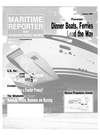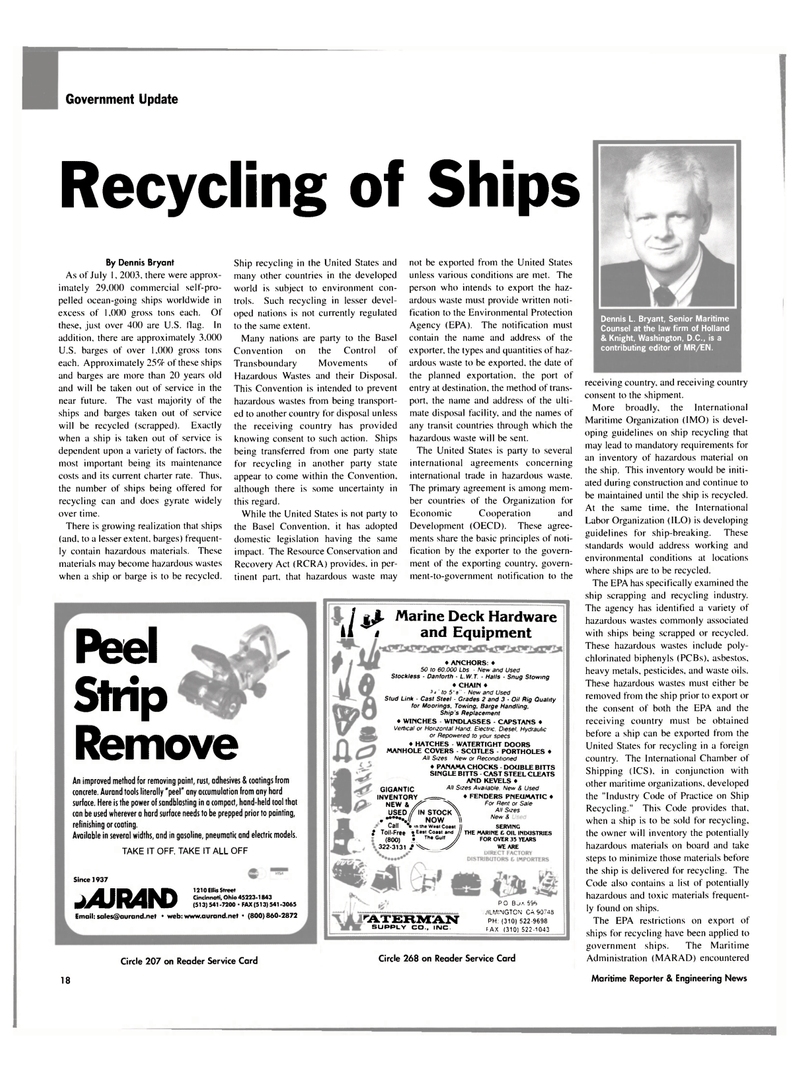
Page 18: of Maritime Reporter Magazine (January 2004)
Ferry & Passenger Vessel Yearbook
Read this page in Pdf, Flash or Html5 edition of January 2004 Maritime Reporter Magazine
Government Update
Recycling of Ships
By Dennis Bryant
As of July 1, 2003, there were approx- imately 29,000 commercial self-pro- pelled ocean-going ships worldwide in excess of 1.000 gross tons each. Of these, just over 400 are U.S. Hag. In addition, there are approximately 3,000
U.S. barges of over 1,000 gross tons each. Approximately 25% of these ships and barges are more than 20 years old and will be taken out of service in the near future. The vast majority of the ships and barges taken out of service will be recycled (scrapped). Exactly when a ship is taken out of service is dependent upon a variety of factors, the most important being its maintenance costs and its current charter rate. Thus, the number of ships being offered for recycling can and does gyrate widely over time.
There is growing realization that ships (and, to a lesser extent, barges) frequent- ly contain hazardous materials. These materials may become hazardous wastes when a ship or barge is to be recycled.
Ship recycling in the United States and many other countries in the developed world is subject to environment con- trols. Such recycling in lesser devel- oped nations is not currently regulated to the same extent.
Many nations are party to the Basel
Convention on the Control of
Transboundary Movements of
Hazardous Wastes and their Disposal.
This Convention is intended to prevent hazardous wastes from being transport- ed to another country for disposal unless the receiving country has provided knowing consent to such action. Ships being transferred from one party state for recycling in another party state appear to come within the Convention, although there is some uncertainty in this regard.
While the United States is not party to the Basel Convention, it has adopted domestic legislation having the same impact. The Resource Conservation and
Recovery Act (RCRA) provides, in per- tinent part, that hazardous waste may not be exported from the United States unless various conditions are met. The person who intends to export the haz- ardous waste must provide written noti- fication to the Environmental Protection
Agency (EPA). The notification must contain the name and address of the exporter, the types and quantities of haz- ardous waste to be exported, the date of the planned exportation, the port of entry at destination, the method of trans- port. the name and address of the ulti- mate disposal facility, and the names of any transit countries through which the hazardous waste will be sent.
The United States is party to several international agreements concerning international trade in hazardous waste.
The primary agreement is among mem- ber countries of the Organization for
Economic Cooperation and
Development (OECD). These agree- ments share the basic principles of noti- fication by the exporter to the govern- ment of the exporting country, govern- ment-to-government notification to the
Dennis L. Bryant, Senior Maritime
Counsel at the law firm of Holland & Knight, Washington, D.C., is a contributing editor of MR/EN. receiving country, and receiving country consent to the shipment.
More broadly, the International
Maritime Organization (IMO) is devel- oping guidelines on ship recycling that may lead to mandatory requirements for an inventory of hazardous material on the ship. This inventory would be initi- ated during construction and continue to be maintained until the ship is recycled.
At the same time, the International
Labor Organization (ILO) is developing guidelines for ship-breaking. These standards would address working and environmental conditions at locations where ships are to be recycled.
The EPA has specifically examined the ship scrapping and recycling industry.
The agency has identified a variety of hazardous wastes commonly associated with ships being scrapped or recycled.
These hazardous wastes include poly- chlorinated biphenyls (PCBs). asbestos, heavy metals, pesticides, and waste oils.
These hazardous wastes must either be removed from the ship prior to export or the consent of both the EPA and the receiving country must be obtained before a ship can be exported from the
United States for recycling in a foreign country. The International Chamber of
Shipping (ICS), in conjunction with other maritime organizations, developed the "Industry Code of Practice on Ship
Recycling." This Code provides that, when a ship is to be sold for recycling, the owner will inventory the potentially hazardous materials on board and take steps to minimize those materials before the ship is delivered for recycling. The
Code also contains a list of potentially hazardous and toxic materials frequent- ly found on ships.
The EPA restrictions on export of ships for recycling have been applied to government ships. The Maritime
Administration (MARAD) encountered
Maritime Reporter & Engineering News
Peel
Strip
Remove
An improved method for removing paint, rust, adhesives & coatings from concrete. Aurand tools literally "peel" any accumulation from any hard surface. Here is the power of sandblasting in a compact, hand-held tool that can be used wherever a hard surface needs to be prepped prior to painting, refinishing or coating.
Available in several widths, and in gasoline, pneumatic and electric models.
TAKE IT OFF. TAKE IT ALL OFF
Since 1937 ju4JR4N> 1210 Ellis Street
Cincinnati, Ohio 45223-1843 (513)541-7200 • FAX (513) 541-3065
Email: [email protected] • web: www.aurand.net • (800) 860-2872 / ^ Marine Deck Hardware il ! and Equipment • ANCHORS: • 50 to 60.000 Lbs New and Used
Stockless - Danforth - L W. T. • Halls • Snug Stowing • CHAIN •
J j " to 5* e New and Used
Slud Link - Cast Steel - Grades 2 and 3 • Oil Rig Quality tor Moorings, Towing, Barge Handling,
Ship's Replacement • WINCHES WINDLASSES CAPSTANS •
Vertical or Horizontal Hand Electric. Diesel. Hydraulic or Ftepowered to your specs • HATCHES - WATERTIGHT DOORS
MANHOLE COVERS SCC1TLES PORTHOLES •
All Sizes New or Reconditioned • PANAMA CHOCKS - DOUBLE BITTS
SINGLE BITTS CAST STEEL CLEATS
AND KEVELS •
GIGANTIC AI1 S'zes Available. New & Used
INVENTORY • FENDERS PNEUMATIC •
NEW & For Ren< or Sale
USED / IN STOCK\ „A" SJz*s
J( NOw tt etv S
Call ,n the West Coast SERVING ; Toil-Free i Ea* Co"',nd ! THE MARINE £ OIL INDUSTRIES (800) • TN*GU" /J FOR OVER 35 YEARS 322-3131 WE ARE rATERMAN
SUPPLY CO., IMC.
P C B J ' >> /ILMINGTCM CA907ii
PH (310) 522-9698
FAX (310) 522-1043
Circle 207 on Reader Service Card Circle 268 on Reader Service Card 18

 17
17

 19
19
